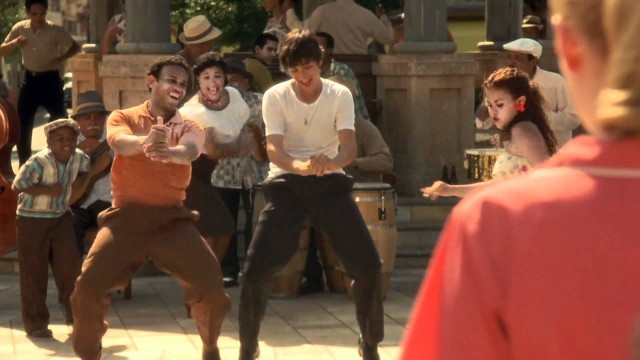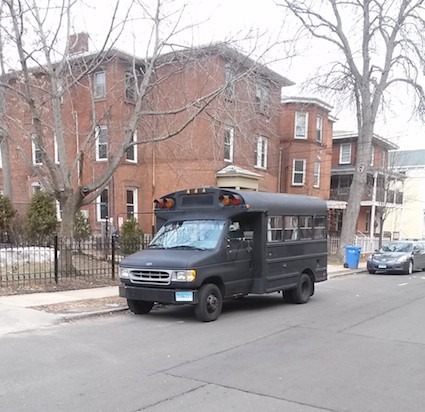Socialism: The Sharing Economy I Want
by Joshua Michtom

Recently, I was considering the logistics of getting 13 members of a brass band from Hartford to New York City as cheaply and expeditiously as possible. While everyone involved is a firm believer in the magic and romance of rail travel, and secondarily, in the unassuming utility of bus travel, we had to concede that it would be much more economical to drive. But driving in the city? And parking? And playing once in Manhattan and then, shortly afterward, in Brooklyn, and then crashing on sundry couches across three boroughs?
No, we would have to leave cars somewhere peripheral, and then take the subway. Plus, when you are an itinerant brass band and the public transit authority in your city has explicitly told you that you cannot play on a moving public bus, the New York subway is where you want to be. But what to do about alternate-side-of-the-street parking, aka, New York City’s brutally efficient car ownership disincentive? We would have to park in a lot, and parking two or three cars in a lot overnight gets expensive.
Then I remembered that some people I barely know who run an arts non-profit in a city near Hartford have a little school bus that they sometimes use as a mobile art gallery. Expecting nothing, I emailed them and asked whether I might borrow the bus for a day, offering to pay with a performance, because that’s all we have to offer. These people had met me exactly once, when my band played at a fundraising concert they organized. Yet they seemed delighted to help.
They dug the benches out of storage and put them back in the bus and bought new bolts to secure them. When I arrived to meet one of them, harried by traffic and half an hour late, he met me and my bandmate with a smile and invited us into his studio for a beer. Did he want me to leave the keys to my truck with him as collateral, or even just so he’d have a hauling vehicle to use while I had the bus? Nope. Just take the bus. Oh, and see how it’s matte black? Feel free to decorate it with chalk. Call if you need anything. Have fun!
This is the sharing economy I want. I want my friends to have keys to my truck and to take it when they need it, because I almost never use it. I want to own a sousaphone that is on permanent loan to someone else. I want people who barely know me to lend me a multi-thousand-dollar vehicle just because they like the idea of a fun, silly brass band getting to play shows for no money. I want just a little bit of everyday socialism.
I understand how this is unrealistic. As adults, we have all learned to operate in a financial world that is essentially predatory. That is to say, we know we must scrutinize sales, contracts, and transactions with the ever-present knowledge that the other person is trying to get over.
But I’m not entirely certain that avarice is inherent in the human condition: I remember being struck, when traveling in Cuba, by how strangers routinely seemed to help one another and to expect help from one another to a degree that I have never seen anywhere else. We can leave for another time the question of whether a repressive, undemocratic regime is the only way to achieve this degree of comity. Certainly there is no doubt that things don’t run that way here in the good old U.S. of A.
But could they, if only on a small scale? One of my friends who has a key to my truck also has his own law practice, and whenever some acquaintance of mine needs lawyer-y help for a good cause, like incorporating a non-profit or going after an unsavory landlord, I know my friend will take care of them, free of charge, if necessary. Another friend who uses my truck — and who is also a snare drummer in my band — also builds sets for a local theater company. For years, when that company has needed promotional material translated into Spanish, they have asked me and I done it happily and without charge. When one of my band’s trombone players broke his foot this summer, that same theater company lent us an old wheelchair from their prop collection so the trombonist could play in a parade. (You can’t play trombone while walking with crutches.)
In all of these little good turns, no one is keeping track, except me, now. Everyone offers help, when they can, without the expectation of compensation, and asks for help in the same spirit. We are loosely bound together by politics, principles, art, geographic proximity, and a lack of resources, and only the ties of friendship, or at least friend-of-friendship, serve to prevent abuses. Presumably, if you tried to scale this up, at some point the bonds and obligations of personal acquaintance would become so attenuated that some guileless entrepreneur would just step in and take advantage. But at what point? And is there some minimally intrusive, private regulatory scheme that could prevent abuses without becoming an awful, overbearing, Park Slope food co-op kind of thing*?
What are your experiences, dear readers, with mutual aid arrangements, whether formal or haphazard? What works? When does resentment about free-riders creep in? While you weigh in on these matters, I have to go stock up on beer and cookies for the coming blizzard, and find a friend with a covered garage where I can park the borrowed short bus.

The short bus. Photo by Josh
* Editor’s note: As a former member of the Park Slope Food Co-op, I would like to defend its besmirched virtue. It has its overbearing members and it makes itself occasionally ripe for mockery. Generally speaking though it’s an impressively functional organization that provides top-notch food at excellent prices, and I miss it very much. If I’m ever a member again, Josh, I’ll give you a tour. — Ester
Support The Billfold
The Billfold continues to exist thanks to support from our readers. Help us continue to do our work by making a monthly pledge on Patreon or a one-time-only contribution through PayPal.
Comments